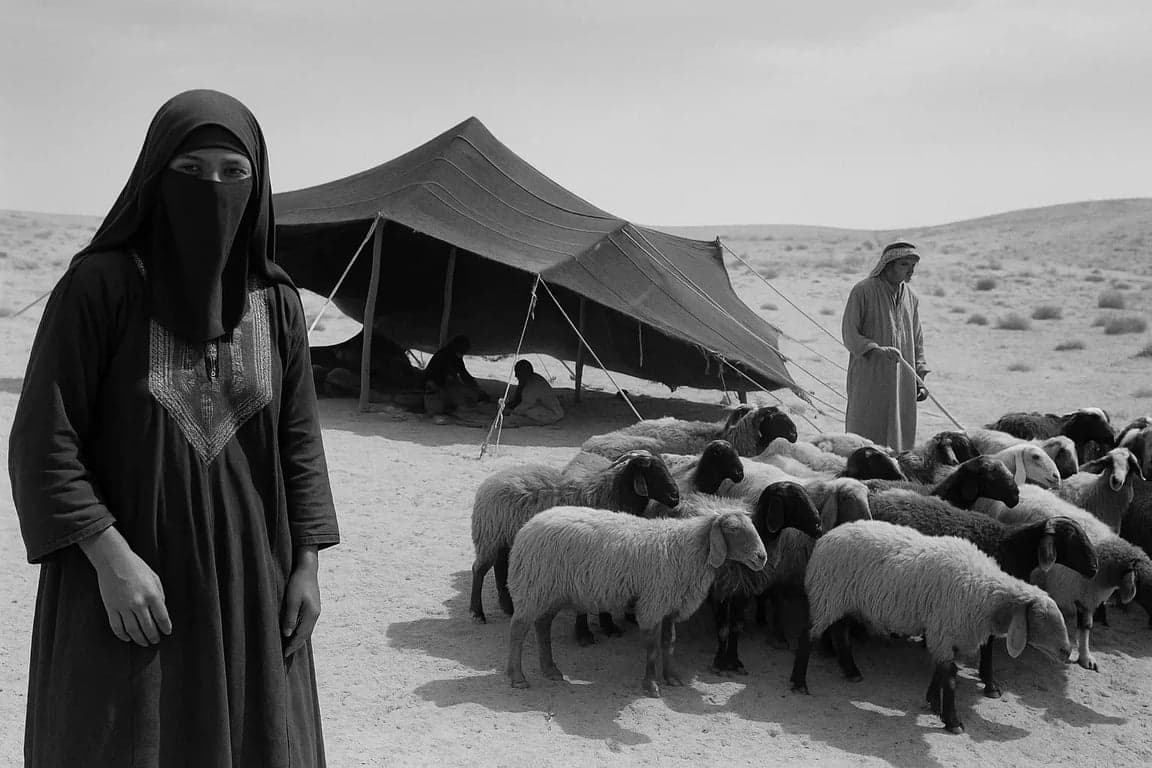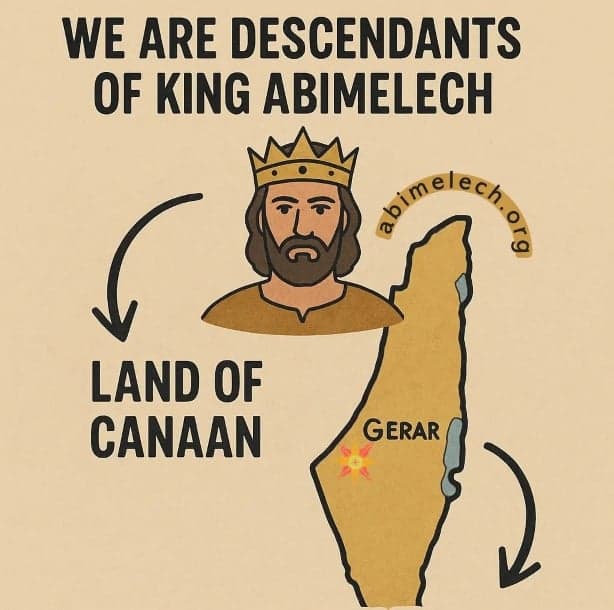 The earliest historical records pertaining to the familial groups represented by the Tribe of Abimelech Platform such as Hassanat Abu Mua'liq, establish longstanding presence in the ancient city-state of Gerar, situated within the southwestern territories of present-day State of Israel and the occupied Palestinian territories, specifically encompassing the region of Beersheba and Gaza and their surrounding localities.
The earliest historical records pertaining to the familial groups represented by the Tribe of Abimelech Platform such as Hassanat Abu Mua'liq, establish longstanding presence in the ancient city-state of Gerar, situated within the southwestern territories of present-day State of Israel and the occupied Palestinian territories, specifically encompassing the region of Beersheba and Gaza and their surrounding localities.
Archaeological findings, historical documentation, and maps dating back as far as Egyptian inscriptions, as well as administrative records and cartographic materials from the Roman, Byzantine, early Islamic, and Ottoman periods, consistently identify the region of Gerar as an important and autonomous urban-agricultural hub, with evidence of continuous habitation tracing back to at least the Bronze Age.
Throughout its documented history, the tribe maintained structured political and social governance over an extensive area stretching from Beersheba westward toward Gaza and northward toward Hebron, forming a stable and organized indigenous societal unit capable of entering into diplomatic relations and formal agreements with neighboring communities and entities.
During the Roman and Byzantine eras, the region was administratively recognized as Saltus Gerariticus, affirming the continuous habitation and structured automatous governance of the Tribe of Abimelech within clearly defined territorial boundaries for over 2,000 years. These boundaries, while shifting slightly due to external pressures, maintained general continuity through successive empires, including the Ottoman administrative period, when local customary laws and tribal governance structures were documented by both Ottoman authorities and later British Mandate officials.
Contact, External Pressures, and Territorial Encroachments
In the early modern era, with the expansion of Ottoman administrative control, the tribe negotiated relative autonomy through established systems of tribal law and informal recognition by Ottoman provincial authorities. However, by the late 19th and early 20th centuries, significant changes occurred due to imperial realignments and increased European intervention. The British Mandate period (1917–1948) introduced considerable upheaval, as external laws and ordinances imposed new categorizations of land ownership, citizenship, and identity classifications. These imposed categories significantly disrupted the tribe’s traditional governance structures and land-use systems. Historical records, such as those by British surveyors, local historians and encyclopedias, specifically documented tribal domains, land tenure systems, and social customs, providing clear evidence of the tribe’s persistent presence and indigenous governance up to the mid-20th century.
Forced Removal, Displacement, and Erasure
The year 1948 marked a catastrophic turning point for the Tribe of Abimelech. With the establishment of the State of Israel, subsequent military operations specifically targeted tribal settlements, including Khirbet Gerar, Khirbet Abu Mu'ailiq, Wadi Gerar, and surrounding localities such as Khirbet Sabala and others. Archival evidence, personal testimonies, and historical analyses by scholars such as Ilan Pappé document systematic displacement campaigns involving direct assaults on tribal infrastructure, particularly vital water resources. Wells and water supplies crucial to the tribe's survival were deliberately attacked, contaminated, or diverted as part of broader military strategies to undermine local resistance. Although members of the tribe sought to defend their lands and maintain access to essential resources, the overwhelming violence employed against their communities, including the use of heavy weaponry in civilian-populated areas, made sustained resistance untenable. Consequently, the tribe was compelled to seek shelter and refuge elsewhere, many in Gaza, where the families subsequently endured conditions of prolonged displacement and refugee status.
Those who remained faced forcible transfer into designated "military zones," notably the Sejaj Zone, or resettlement into newly established "Bedouin towns," areas characterized by severe restrictions on movement, land use, and political autonomy. Unlike many indigenous groups recognized internationally, the Tribe of Abimelech has yet to receive any formal recognition, restitution, or reparative measures from state or international authorities.
Contemporary Legal Struggles and Denial of Recognition
Unlike global indigenous tribes in other contexts, such as the Cherokee, Lakota, or Mi'kmaq nations, who secured varying degrees of sovereignty, land rights, and reparations, the Tribe of Abimelech has remained systematically unrecognized by state authorities. Under contemporary Israeli law, the tribe’s ancestral lands are classified as "state lands," and its settlements are often labeled as "unrecognized villages," which face frequent demolitions and denial of essential services. Despite clear historical documentation of continuous occupation and recognized tribal structures, the tribe remains categorized broadly and inaccurately as "Arab Bedouin," negating the tribe’s specific historical lineage and territorial claims rooted in ancient Gerar.
International Indigenous Rights Frameworks
In recent decades, international legal standards and norms have clearly defined the rights of indigenous peoples, including the United Nations Declaration on the Rights of Indigenous Peoples (UNDRIP) adopted in 2007. Under these international frameworks, indigenous peoples possess the right to self-determination, the preservation of cultural heritage, control of ancestral lands, and maintenance of political and social institutions. While states such as the United States, Canada, New Zealand, and Australia have begun processes of formal recognition, restitution, and reparative justice for their indigenous populations, the Tribe of Abimelech continues to face an ongoing denial of these rights. The current legal and political frameworks within Israel and internationally have yet to formally acknowledge or protect the tribe’s historical claims and indigenous status.
A Call for Recognition and Protection
This historical narrative serves as a formal assertion of the indigenous continuity, territorial claims, and political identity of the Tribe of Abimelech. It represents a scholarly and community-based appeal directed toward state authorities, academic researchers, international human rights organizations, and relevant policy-making bodies, calling upon them to formally recognize the indigenous status and inherent rights of this historically rooted tribe. Such acknowledgment is essential to initiating processes of legal protection, cultural preservation, and restorative justice in accordance with internationally established indigenous rights frameworks.
Recognition of the tribe’s indigenous claims is a necessary step toward addressing not only historical injustices but also the ongoing crisis of displacement and marginalization in Gaza. Currently, the Tribe of Abimelech faces imminent extinction within its ancestral homeland, primarily due to decades of systematic displacement, restrictive settlement policies, resource denial, and broader institutional neglect. Many families associated with the tribe have been died in the war in Gaza, compelled to relocate or live under conditions severely limiting their ability to maintain traditional ways of life. The impact of this prolonged displacement has disrupted the tribe's social structures, endangered cultural practices, and fragmented familial ties. Further information regarding specific family histories, lineage details, and the broader community context can be accessed at abimelech.org/about/families.
This call for recognition is not merely symbolic; it seeks practical and structural remedies. Recognition would ensure the protection of traditional lands, preservation of cultural heritage, and restoration of tribal autonomy, fundamental rights already acknowledged and implemented in other contexts globally. Such measures are critical to the survival and cultural continuity of the tribe, whose presence and historical governance in the region have been well-documented academically and historically.
For individuals, researchers, advocates, or members of the global community wishing to support the Tribe of Abimelech platform's effect efforts toward recognition and preservation of the tribe, there are structured ways to participate. One may join the tribal platform as a formal tribal member, friend, or supporter by visiting abimelech.org/join. Additionally, for those who seek to offer one-time contributions or assistance toward immediate efforts at preserving tribal heritage and maintaining community resilience, opportunities for direct support are provided at abimelech.org/support or on the GoFundMe platform.
The appeal for recognition of the Tribe of Abimelech aligns with international legal standards and widely recognized indigenous rights principles. Recognition and protection constitute vital corrections to historical oversights and contemporary injustices. It is imperative, therefore, that this tribe receive formal acknowledgment as a rightful measure to rectify past and present marginalization, ensuring the tribe’s ability to exist sustainably, securely, and autonomously within its ancestral lands.





